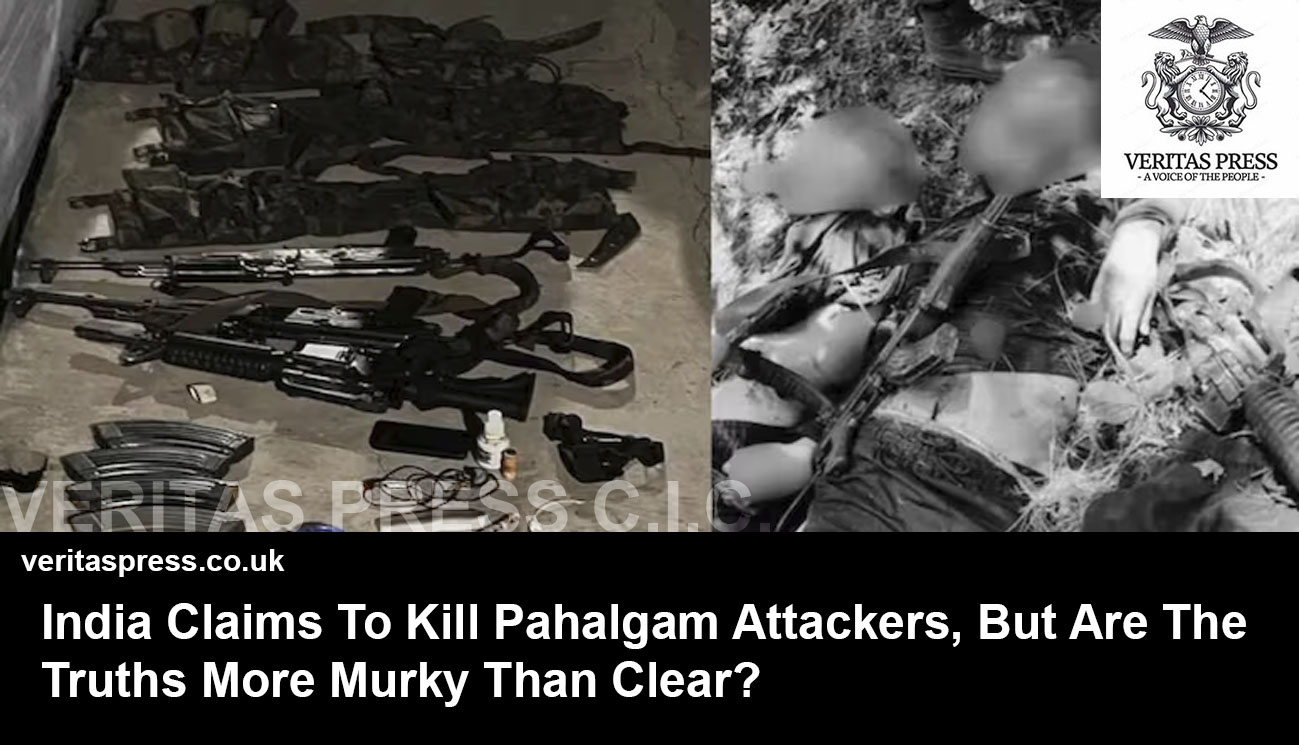The Palestinian group Hamas has condemned recent remarks by far-right Israeli Finance Minister Bezalel Smotrich as an “explicit threat to continue the crimes of genocide and forced displacement” in the Gaza Strip. The warning comes amid escalating Israeli settler and military aggression across the occupied Palestinian territories, and growing alarm over Israel’s formal moves toward annexation.
Speaking at a right-wing conference this week, Smotrich said Israel is “closer than ever” to rebuilding the illegal settlement bloc of Gush Katif in the Gaza Strip, which was dismantled during the 2005 “disengagement.” He called Gaza “an integral part of the land of Israel” and suggested that permanent Israeli reoccupation was now on the table.
“This statement coincides with parallel moves aimed at imposing the occupation’s ‘sovereignty’ over the West Bank,” Hamas said in a statement. “We affirm that this dangerous occupation escalation will be met with all forms of legitimate resistance in defence of our land and national rights.”
The remarks follow revelations published by Israeli outlet Haaretz that Israeli Prime Minister Benjamin Netanyahu has proposed annexing parts of Gaza to the security cabinet as part of a deal to appease Smotrich and keep him in the governing coalition. The finance minister, head of the Religious Zionism party, has threatened to resign unless Israel makes “irreversible” moves in Gaza and the West Bank.
According to sources familiar with the discussions, Netanyahu’s plan includes establishing “security zones” in northern and central Gaza, effectively placing them under Israeli control. Legal experts and Palestinian officials say such a move would constitute a clear violation of international law, further entrench the military occupation, and heighten the risk of ethnic cleansing.
Coordinated Expansionism: Gaza And The West Bank In The Crosshairs.
Smotrich’s comments are widely seen as part of a broader settler-colonial strategy to erase the 1949 Armistice Line and entrench permanent Israeli control across both Gaza and the West Bank. Analysts note that the timing of his statements coincides with aggressive settlement expansion and settler-led violence in the occupied West Bank, particularly near Christian and Muslim Palestinian communities.
In the early hours of Monday morning, Israeli settlers launched a new attack on the Christian village of Taybeh, east of Ramallah. The settlers torched two Palestinian-owned vehicles and spray-painted racist and threatening graffiti on village walls, including the ominous message: “You’ll regret it later.”
The incursion follows a similar assault on July 14, in which settlers set fire to Taybeh’s historic Church of Saint George and its adjoining cemetery, an act that drew rare rebuke even from the United States. In an unusual statement, U.S. Ambassador to Israel Mike Huckabee condemned the attack, calling it “terror and violence” and pledging to push for the prosecution of those responsible.
But Taybeh residents say such words are cold comfort amid an intensifying pattern of state-backed settler aggression.
“The settlers act with impunity, and the soldiers protect them,” said Daoud Issa, a local shopkeeper. “They burn our churches and then the army raids our homes. This is not just intimidation, it’s displacement by force.”
The Israeli army reportedly entered the village shortly after the settlers’ departure, conducting searches and spreading panic among the residents, many of whom now fear that Taybeh could become the next target for full-scale land seizure.
The attacks coincide with the recent establishment of a new illegal Israeli outpost near Taybeh in June, part of a wave of settlement projects greenlit by Smotrich’s ministry. Human rights groups say these projects are rapidly turning the West Bank into a patchwork of disconnected Palestinian enclaves surrounded by militarised settler infrastructure.
Gaza Genocide And The ‘Return’ To Gush Katif:
Smotrich’s calls to reestablish Gush Katif, dismantled during Ariel Sharon’s controversial 2005 disengagement plan, have reignited fears among Palestinians and legal observers of a new phase of colonisation. During Israel’s ongoing military campaign in Gaza, large swathes of land have been flattened, especially in the so-called “buffer zone” that now covers nearly half the Strip. Israeli officials and far-right activists have openly floated the idea of replacing displaced Palestinians with Jewish settlers.
“Smotrich’s vision is not new,” said Diana Buttu, a former legal adviser to the Palestinian peace negotiation team. “But what’s different now is the political climate. There’s no international accountability, and there’s a genocide underway in Gaza. Smotrich and his allies see an opportunity to finish what was started in 1948.”
Since October 2023, over 100,000 Palestinians have been killed in Israel’s assault on Gaza, according to the Ministry of Health. Entire neighbourhoods have been erased, while food, medicine, and water remain severely restricted. According to multiple UN agencies, famine is spreading, with children dying of starvation and dehydration.
“What Smotrich is proposing is not just a return to Gush Katif, it’s the permanent ethnic cleansing of Gaza,” said Omar Shakir, Israel and Palestine Director at Human Rights Watch. “It is a crime in progress, and the world is watching it unfold in real time.”
Impunity, Resistance, And The Road Ahead:
Hamas’s statement underscored what many in the Palestinian resistance see as the need for a unified response to Israel’s twin-track war of conquest, by bulldozer in the West Bank and by bomb in Gaza.
“This escalation is not isolated,” said the statement. “It is part of a coordinated settler project that aims to erase our presence from all of historic Palestine. Our people will respond with steadfastness and resistance in all its forms.”
While global attention is largely focused on the humanitarian catastrophe in Gaza, Palestinian communities in the West Bank report an upsurge in settler violence, home demolitions, and military raids.
According to the Israeli rights group B’Tselem, over 900 Palestinians have been displaced in the West Bank since the start of the Gaza war due to settler violence and army-backed land seizures. Entire villages in the South Hebron Hills and Jordan Valley have been depopulated under what the UN describes as “forcible transfer.”
Meanwhile, the international community remains largely paralysed. Despite mounting evidence of war crimes, including the weaponisation of famine and the targeting of civilian infrastructure, key Western powers continue to supply arms and political cover to Israel.
“From Gaza to Taybeh, the pattern is clear: settler colonialism enabled by military violence and impunity,” said Yara Hawari, senior analyst at Al-Shabaka. “Whether it’s a church in a West Bank village or a refugee camp in Gaza, no Palestinian place is sacred or safe. That is the message Smotrich and Netanyahu are sending.”
As Israel’s far-right government doubles down on annexation and ethnic cleansing, Palestinians and international observers warn that without immediate intervention, the crimes of today may soon become permanent facts on the ground.
Conclusion: A System Of Erasure, Land, Faith, And Memory.
What is unfolding across Gaza and the West Bank is not a series of isolated incidents, but a deliberate, state-directed strategy to erase Palestinian life in all its forms. Finance Minister Bezalel Smotrich’s call to reestablish Gush Katif in Gaza, and Prime Minister Netanyahu’s secret proposal to annex parts of the Strip, expose what Palestinian communities, human rights groups, and legal experts have warned for decades: that the Israeli state is not merely maintaining an occupation, it is executing a comprehensive, settler-colonial project of destruction, displacement, and replacement.
This project does not stop at the bulldozing of homes or the expansion of illegal settlements. It targets the totality of Palestinian existence, from faith to food, from memory to identity.
In the West Bank, settler attacks are increasingly focused on religious institutions, as seen in the arson of Taybeh’s historic Church of Saint George and the desecration of its cemetery. These are not random acts of vandalism, they are deliberate assaults on Palestinian spiritual life and community resilience. Mosques, churches, shrines, and cemeteries have all been placed in the crosshairs of an occupation that seeks to sever Palestinians from their sacred spaces.
Agriculture, too, is under attack. Olive groves, symbols of rootedness and generational continuity, are routinely burned, uprooted, or fenced off by settlers with army backing. In Gaza, Israel’s military campaign has decimated farmlands, fisheries, and water infrastructure, ensuring that Palestinians not only lose their homes, but also the means to sustain life and culture.
Even history is a battlefield. From the looting of Palestinian archives and artifacts to the demolition of ancient villages and the distortion of historical narratives, Israel’s policy is aimed at erasing the historical Palestinian presence on the land and replacing it with a fabricated narrative of exclusive Jewish indigeneity.
“This is not just a military occupation. It’s an assault on memory, on land, on faith, on the very soul of a people,” said Dr. Nur Masalha, a historian and author of Palestine: A Four Thousand Year History.
All of this is taking place in plain view. Israeli ministers do not shy away from their intentions, they boast about them. Smotrich and his allies have openly called for the expulsion of Palestinians, the reestablishment of settlements in Gaza, and the imposition of full Israeli sovereignty from the river to the sea.
What makes this moment uniquely dangerous is that the language of genocide and ethnic cleansing is no longer hidden, it is policy, spoken aloud, backed by tanks and bulldozers, and executed with international impunity.
Meanwhile, Western governments, despite voicing token condemnations, continue to arm, finance, and shield the very forces committing these crimes. Their silence in the face of settler pogroms, church burnings, agricultural sabotage, and annexation plans is not neutrality, it is complicity. If the goal is to uproot the people, erase the past, and colonize the future, then the question facing the world is no longer whether this constitutes a war crime. The question is: how much of Palestine must be destroyed before the world admits it always knew?
Advertisement
Reviews by RevJunkie..
Tags:





























Leave a Reply